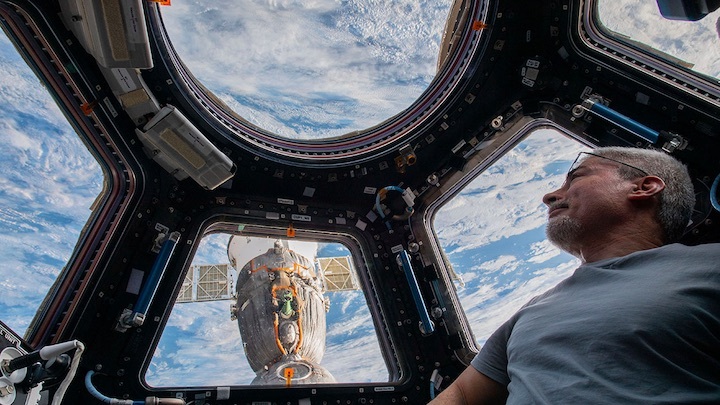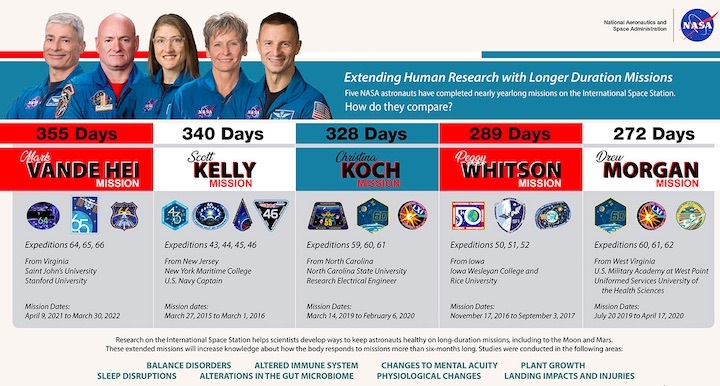16.03.2022

When NASA astronaut Mark Vande Hei launched into space 11 months ago, he did not know how long he would be off the planet, let alone that he would be up there long enough to set any records.
But when the clock strikes 12:24 p.m. EDT (1624 GMT) today (March 15), Vande Hei will claim the title of the U.S. astronaut with the single longest spaceflight in history. At a mission elapsed time of 340 days, 8 hours and 42 minutes, Vande Hei will surpass the duration logged by NASA astronaut Scott Kelly on March 2, 2013.
From Tuesday afternoon forward, until his scheduled ride home on March 30, Vande Hei's record will continue to grow. His stay aboard the International Space Station is expected to wrap just short of a full year at 355 days.
"I didn't know with certainty that the flight would be this long when I launched, but I certainly knew that it was a possibility," Vande Hei said in an interview with CBS News in January. "I felt like it was an opportunity to fill a need that we had, and I was very happy to be able to fill it."
Vande Hei arrived at the space station aboard a Russian Soyuz spacecraft on April 9, 2021, knowing at the time that he would be there for at least for the five to six months that is typical today for expedition crew members. His mission was extended by NASA in September to allow for a Russian movie crew to visit the orbiting complex and, more importantly, protect against a crew rotation schedule that could leave the station without any Americans on board.
"I am in space to make sure that we had a continuous U.S. presence on the space station," Vande Hei told ABC News. "Crews didn't overlap most recently and I was the only [American] on the space station for about a week because of that."
Vande Hei's additional time in space also gave NASA an opportunity to learn more about how astronauts adapt to life in microgravity for longer periods of time. Kelly's 340 days had been carried out for just that reason, as the space agency began looking at how to send astronauts on missions into deep space, back to the moon and eventually to Mars.
"I came back from my [first] flight feeling like spaceflight is a really big sacrifice," Vande Hei said, referring to his 168-day stay on the space station in 2018. "It was hard. I think psychologically, I was just kind of beating myself up every time I made mistakes."
"This time around, I'm in a better spot. I think I'm really paying attention to the inner voice, trying to tell myself, 'you know what, you got this,' and when you make little mistakes, just kind of laugh it off," he said. "It's been really pleasant. It's been really a lot of amazing experiences."
Vande Hei also took up meditation, which helped, especially given where he chose to practice it aboard the space station.
"I decided to start doing it in front of our biggest window, the Cupola. So every morning, before everyone else is awake and with all the lights off, I can sit and look for 20 minutes at the stars," he told CBS News. "I feel very, very fortunate to have those experiences."
Vande Hei is not the only member of the station's Expedition 66 crew to reach his 340th day in space on Tuesday: Roscosmos cosmonaut Pyotr Dubrov has been on board just as long. Unlike the Americans, though, Russians have logged even longer space missions. Three cosmonauts — Musa Manarov, Vladimir Titov and Valery Polyakov — have topped Vande Hei's U.S. record.
Polyakov flew the longest space mission in history almost 30 years ago. The first person to spend a continuous full year in space, Polyakov lived on the former space station Mir from January 1994 to March 1995, for a total of 437 days, 17 hours and 58 minutes.
Vande Hei said the toughest aspects of his time in space has been being confined inside the space station ("it's very much an indoor job") and being separated from his family for so long.
"But I can keep that in perspective, because we've got so many military folks that have to do this routinely, as well. So I really can't feel sorry for myself," said Vande Hei, who is a retired colonel in the U.S. Army.
He also said he could go longer, but only if required.
"If they said I needed to stay up longer, I would happily stay up longer, but I would not volunteer to stay up longer," he said.

Graphic outlining the history of NASA astronauts on extended stays on board the International Space Station. (NASA)
Quelle: CS
